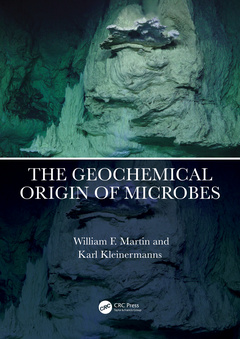The Geochemical Origin of Microbes
Auteurs : Martin William F., Kleinermanns Karl

This is a textbook covering the transition from energy releasing reactions on the early Earth to energy releasing reactions that fueled growth in the first microbial cells. It is for teachers and college students with an interest in microbiology, geosciences, biochemistry, evolution, or all of the above. The scope of the book is a quantum departure from existing ?origin of life? books in that it starts with basic chemistry and links energy-releasing geochemical processes to the reactions of microbial metabolism. The text reaches across disciplines, providing students of the geosciences an origins/biology interface and bringing a geochemistry/origins interface to students of microbiology and evolution. Beginning with physical chemistry and transitioning across metabolic networks into microbiology, the timeline documents chemical events and organizational states in hydrothermal vents ? the only environments known that bridge the gap between spontaneous chemical reactions that we can still observe in nature today and the physiology of microbes that live from H2, CO2, ammonia, phosphorus, inorganic salts and water. Life is a chemical reaction. What it is and how it arose are two sides of the same coin.
Key Features
- Provides clear connections between geochemical reactions and microbial metabolism
- Focuses on chemical mechanisms and transition metals
- Richly illustrated with color figures explaining reactions and processes
- Covers the origin of the Earth, the origin of metabolism, the origin of protein synthesis and genetic information as well as the escape into the wild of the first free-living cells: Bacteria and Archaea
Chapter 1 The Early Earth Setting and Chemical Fundamentals
Chapter 2 Origin of Organic Molecules
Chapter 3 Primordial Reaction Networks and Energy Metabolism
Chapter 4 Prebiotic Synthesis of Monomers and Polymers
Chapter 5 Template Directed Synthesis of Polymers
Chapter 6 Innovations on the path to cellularity
Chapter 7 Harnessing energy for escape as free-living cells
Appendix
References for further reading
Solutions to problems
Index
William F. Martin received his undergraduate (diplom) degree in biology 1985 from the Technische Universität Hannover and his Ph.D. in Genetics 1988 from the Max-Planck-Institute for Breeding Research in Cologne on molecular evolution. He completed postdoctoral work at the Technische Universität Braunschweig with a habilitation on the evolution of primary metabolism. Since 1999 he has held a chair in Biology at the University Düsseldorf as head of the Institute of Molecular Evolution. Author of more than 350 scientific publications that have been cited over 45,000 times, he has served as referee for 135 different journals, 50 different funding agencies, as editor for 16 different journals and as panelist on various advisory boards. He is an Elected Fellow of the Nordrhein-Westfälische Akademie der Wissenschaften, the American Academy for Microbiology, the European Molecular Biology Organisation, and Corresponding Foreign Member of the Accademia delle Scienza di Bologna. His distinctions for work on molecular evolution include the Heinz-Maier-Leibnitz Prize of the Deutsche Forschungsgemeinschaft in 1990, a Julius von Haast Fellowship from the New Zealand Ministry for Science in 2006, the Klüh Foundation Award for Science and Research in 2018, and the Motoo Kimura Award of the Motoo Kimura Trust Foundation in 2023. Since 2009 his work has been funded by three Advanced Grants from the European Research Council. His main scientific interests are chemical and biochemical evolution, endosymbiosis, microbial evolution, and early evolution including the origin of microbial cells.
Karl Kleinermanns received his diplom degree in chemistry at the RWTH Aachen and his Ph.D. in Physical Chemistry at the Max-Planck in Göttingen about laser induced chemical reactions. He then completed a postdoctoral fellowship at the IBM research laboratories in San Jose, California and a habilitation about kinetics and dynamics of elementary oxidation reactions at the univ
Date de parution : 06-2024
21x29.7 cm
Thèmes de The Geochemical Origin of Microbes :
Mots-clés :
molecular evolution; autocatalysis; organic polymers; thermodynamics; hydrothermal vents



